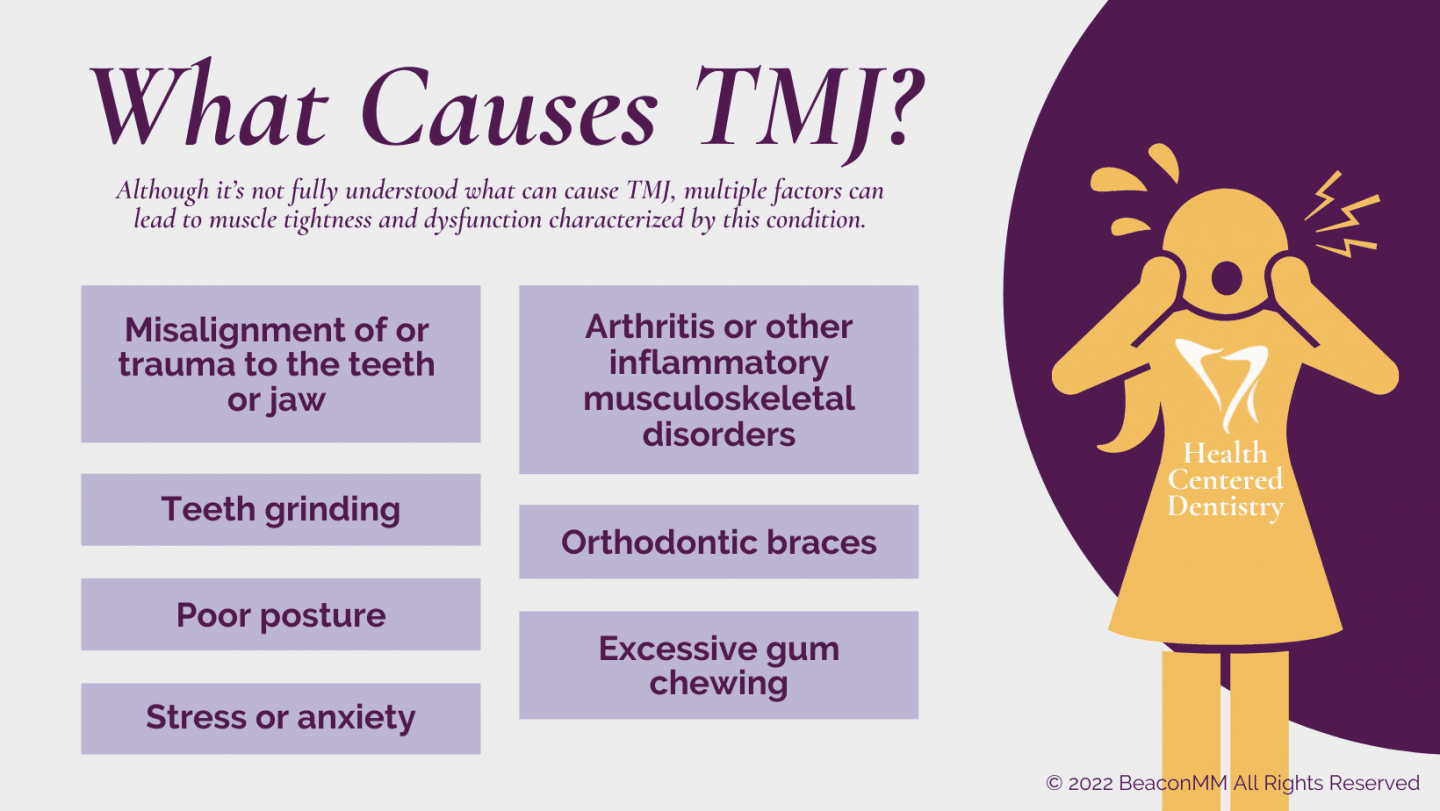Many people have habits that they don’t notice until someone points it out or it starts to cause them issues. These patterns can be hard to manage because you didn’t realize you were doing them in the first place.
Some habits, such as grinding your teeth, may only occur when you’re deeply focused on something or asleep. However, they can cause painful issues that you’d like to stop and prevent.
Many people who struggle with these habits or have a misaligned jaw can experience dysfunction with their temporomandibular joint (TMJ). This can be a painful injury that a dentist can sometimes help treat. Here’s a guide on what a TMJ disorder is and how a TMJ specialist in Alaska can help you.
Are you interested in how a holistic dentist can help your TMJ pain? Contact Health Centered Dentistry today!
What is TMJ Disorder?
TMJ pain is cause by a disorder of the jaw muscles and nerves caused by injury or inflammation to the temporomandibular joint. This joint connects the jawbone and the skull, which can be a painful injury that affects the jaw’s chewing, clicking, cracking, and popping. This condition is called a temporomandibular joint disorder, or TMD.
Many people will experience swelling on the sides of their faces as the joint is injured. This is usually self-diagnosable since the pain can be overwhelming and lead to someone researching how to treat TMD. It is best practice to get seen by your dentist to get help with whatever caused your TMJ pain and get help creating a treatment plan.
What Causes TMJ?

Although it’s not fully understood what can cause TMD, multiple factors can lead to muscle tightness and dysfunction characterized by this condition. Discovering the exact cause of a person’s TMJ pain can be difficult as it can be from a singular or combined source. Some causes of your TMD could include:
- Misalignment of or trauma to the teeth or jaw
- Teeth grinding
- Poor posture
- Stress or anxiety
- Arthritis and other inflammatory musculoskeletal disorders
- Orthodontic braces
- Excessive gum chewing
These actions could lead to TMJ dysfunction, as they put excess stress on the temporomandibular joint that holds your jaw in place. Avoiding these practices could lower your risk of getting TMD or mitigate its severity.
What Are Risk Factors for TMJ?
Although everyone is susceptible of getting TMJ, some factors may make you more at risk of getting TMJ. Those factors could include the following:
- Poor posture in the neck and upper back muscles leads to neck strain and abnormalities in jaw muscle function.
- High stress may increase muscle tension, jaw clenching, or teeth grinding.
- Women between 18-44 years of age have an increased risk.
- Patients with chronic inflammatory arthritis.
- People with jaw trauma or poorly positioned teeth.
- Those who have a genetic predisposition to pain sensitivity and increased stress responses.
If you align with these risk factors and have experienced jaw pain, you should seek help from your dentist. They can provide more information specific to your condition and create an appropriate treatment plan.
Are you unsure if you have TMJ? Get your consultation at Health Centered Dentistry!
What Are the Symptoms of TMJ?
The main TMD symptom is a pain in the jaw joint. As the joint is located in front of your ear, there are many places where you may feel pain, including the face, eye, forehead, ear, or neck. The following are common symptoms of TMD that you may experience.
- Pain or tenderness in the jaw
- Popping or clicking of the jaw
- Pain that feels like a toothache
- Ear pain or sounds of cracking in the ears
- Ringing or popping sounds in ears
- Sense of fullness in ears
- Headaches or migraines
- Blurred vision
- Tight, stiff, or sore jaw or neck muscles
- Muscle spasms in the jaw
- Facial, mouth, jaw, cheek, or chin pain, numbness, or tingling
- Pain at the base of the tongue
- Pain, swelling, or a lump in the temple area
- Difficulty chewing
- Shoulder pain
- Locking or dislocation of the jaw
- Dizziness or vertigo
These symptoms can be mild or severe. You may also experience multiple of them simultaneously or in waves. These symptoms could worsen over time if left untreated, so getting help from a holistic dentist is the first step to restoring function and minimizing pain in your jaw.
How to Treat TMJ?
The symptoms of TMD can be painful and affect your daily life. Although you can’t fully treat TMJ pain on your own, there are a few methods to mitigate the pain. The best home remedies that may provide some relief consist of:
- Ice or cold packs to the area of the joint
- Over-the-counter anti-inflammatory drugs such as ibuprofen
- Eating soft foods and avoiding chewing gum
- Massage or gentle self-stretching of the jaw and neck muscles
- Relaxation techniques and stress management and reduction
- Some sedative essential oils
Those treatments can help mitigate the pain; however, they won’t cure your TMD. To get an effective treatment, you will need to seek medical help. Going to your dentist will be a great option as they can offer several treatment options, including the following:
- A dental splint (or bite guard) keeps the teeth in alignment and prevents tooth grinding.
- Some professionals may use Botox to relax the jaw muscles, but this is not currently an FDA- approved treatment for TMJ.
- Physical therapy with jaw exercises can strengthen muscles, improve flexibility, and range of motion.
- Some physicians may prescribe medical marijuana to help with pain in states where it’s legal.
- Biobehavioral management could help with immense pain.
- Trigger point acupuncture can sometimes help.
- In severe cases, they may recommend dental surgery.
- Some prescription-strength medicines may be used to treat TMJ.
Without proper treatment, the symptoms could worsen. Seeking treatment will help you recover and possibly prevent it from happening in the future.
How Can a Holistic Dentist Help Treat Your TMJ?
Depending on the severity of your TMJ, you may not want to get intensive treatment. Going to a holistic dentist for your TMJ can be a great way to get treatment healthily.
Holistic dentistry takes into account the function of your body as a whole. We understand that factors such as your oral health, the teeth, gums, jaw, muscles, nerves, and throat work together to help you achieve daily functions such as chewing or talking. When you get help from a holistic dentist, they are interested in treating the problem at its source.
TMJ can be caused by a singular or combined factor, which means that treating it requires a careful examination of everything that could be causing it. It also means that creating your treatment plan should focus on how your body parts interact with one another.
At Health Centered Dentistry, you can get treated for TMJ by experts. They can help curate a mouth guard that you can use during the day or night to help protect your jaw and teeth. It can also help reduce the pain you feel after a stressful day or waking up in the morning.
We also work with local Alaskan physical therapists that can help you receive therapy that will reduce or ease the pain of TMJ disorders. Our holistic approach to care means that we focus on your whole-body wellness.
We offer many family dentistry services for all ages, such as regular check-ups, cosmetic procedures, restorative treatments, and oral surgery. Health Centered Dentistry also utilizes the most up-to-date dentistry equipment and holistic services such as safe amalgam removal and ozone treatment.
Are you ready to start your TMJ treatment? Schedule an appointment with Health Centered Dentistry today!


